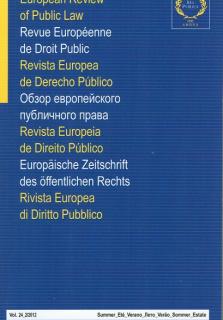
Constitutional Law / Droit constitutionnel
2011
THE NETHERLANDS / PAYS-BAS
REMCO NEHMELMAN
Senior Lecturer of Constitutional Law, Utrecht University, the Netherlands
Constitutional Law in the Netherlands in 2011 was very much concentrated on political topics. Very important were the general elections for the Dutch Senate, First Chamber. The minority government did not succeed to win the elections and therefore the support of a small fundamentalist religious political party (SGP) was necessary. A Bill was drafted on transparency of political party funding. Also the position of the Dutch Queen (in constitutional terms 'the King') was once again an issue. However, the Dutch Prime Minister was not willing to change anything con¬cerning the constitutional role of the Monarch. The minister of the Interior explained that the Dutch government wanted to wait for the decision of the European Court of Human Rights (Strasbourg) concerning the case of the small fundamentalist religious political party (SGP) and the position of women for standing for elections. The leader of the Party of Liberty (PVV) Geert Wilders was acquitted by the District Court of Amsterdam as not having violated the right to freedom of expression. And once again the role of the Dutch Parliament relating to the financial crises in the Eurozone was discussed. The minister of Finance made some remarkable statements such as: 'It is actually better not to go to parliament every time there is an (financial) emergency.'
En 2011, le droit constitutionnel aux Pays-Bas s'est essentiellement concentré sur des sujets politiques. Les élections générales au sénat, la Première Chambre, ont été très importantes. Le gouvernement minoritaire n'a pas réussi à remporter les élections et le soutien d'un petit parti politique religieux fondamentaliste (SGP) a été nécessaire. Une loi relative à la transparence du financement des partis politiques a été adoptée. La place de la reine ("le roi" en termes constitutionnels) a été de nouveau discutée. Cependant, le Premier ministre n'a pas souhaité modifier quoi que ce soit concernant le rôle constitutionnel du monarque. Le ministre de l'Intérieur a expliqué que le gouvernement désirait attendre l'arrêt de la Cour européenne des droits de l'homme de Strasbourg dans l'affaire du petit parti politique religieux fondamentaliste (SGP) et concernant la place des femmes candidates aux élections. Le chef du Parti de la Liberté Geert Wilders a été acquitté par la Cour fédérale d'Amsterdam et n'a pas violé le droit à la liberté d'expression. Le rôle du Parlement dans les crises financières de la zone euro a été discuté une fois de plus. Le ministre des Finances a fait quelques déclarations remarquables, telles que: "En fait, il vaut mieux ne pas aller au Parlement chaque fois qu'il y a une urgence (financière)".





















